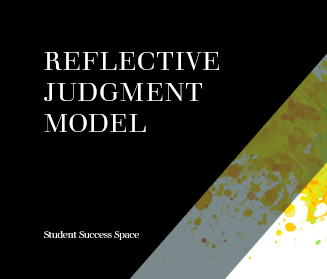In 1994, King and Kitchener developed the Reflective Judgment Model to examine how individuals arrive at conclusions and approach problems. Their model has seven different stages to describe the process. As the individual moves through these stages, the learner is able to demonstrate skills and understanding.
Stages One, Two and Three fall under the Category of Pre-Reflective Thinking
Stage One
During the first stage, individuals look at knowledge as an absolute. Think of it as black/white. They do not notice that there may be an abstract point of view to the information. Information is derived from direct observation or interaction with the material. Other approaches, beliefs or referred to as a ‘grey’ area do not exist.
King and Kitchener propose the learner in this stage is identified by the phrase,
“I know what I have seen.”
Stage Two
Knowledge is seen as absolute but may not be immediately available to the learner. At this stage, knowledge and learning is only available through the senses. Information must be received through experts. All information is examined and judged by the source. If the source of the information comes from a valid authority figure, the information must be correct.
King and Kitchener propose the learner in this stage is identified by the phrase,
“If it is on the news, it must be true.”
Stage Three
In this stage, knowledge is actually temporary in nature. The information may or may not be true unless it has been validated by the authority. There is some doubt.
King and Kitchener propose the learner in this stage is identified by the phrase,
“When there is evidence that people can give to convince everybody one way or another, then it will be knowledge; until then, it’s just a guess.”
Stages Four and Five fall under the Category of Quasi-Reflective Thinking
Stage Four
At this stage the knowledge is uncertain or situational. There may always be a sense of ambiguity. The beliefs and evidence may or may not be true. They can be manipulated to please the individual.
King and Kitchener propose the learner in this stage is identified by the phrase,
“I’d be more inclined to believe evolution if they had proof. It’s just like the pyramids: I don’t think we’ll ever know. Who are you going to ask? No one was there.”
Stage Five
Knowledge is contextual. It is subjective. It is interpreted through evidence and events. The learner will balance the information against the situation. They will look at interpretation which delays the conclusions.
King and Kitchener propose the learner in this stage is identified by the phrase,
“People think differently and so they attack the problem differently. Other theories could be as true as my own, but based on different evidence.”
Stages Six and Seven fall under the Category of Reflective Thinking
Stage Six
At this stage, the learner will look at knowledge from a variety of sources and being to evaluate the evidence based upon the different sources. They will weigh the evidence and come to conclusions.
King and Kitchener propose the learner in this stage is identified by the phrase,
“It’s very difficult in this life to be sure. There are degrees of sureness. You come to a point at which you are sure enough for a personal stance on the issue.”
Stage Seven
Knowledge is gathered through an inquiry process to develop solutions to pre-identified problems. The learner will look at evidence with a new perspective and use the necessary tools. “ Conclusions are defended as representing the most complete, plausible, or compelling understanding of an issue not the basis of the available evidence” (Packet 3).
King and Kitchener propose the learner in this stage is identified by the phrase,
“One can judge an argument by how well thought-out the positions are, what kinds of reasoning and evidence are used to support it, and how consistent the way one argues on this topic is as compared with other topics.”
Source:
King and Kitchener. (1994). The Reflective Judgment Model. Available at: https://thepurposefulprof.org/wp-content/uploads/2018/05/king-and-kitchener-reflective-judgment-model-1.pdf


Comments are closed